Catalogue > List by artist
Browse the entire list of Rencontre Internationales artists since 2004. Use the alphabetical filter to refine your search. update in progress
Tristan Mendes France
Catalogue : 2006Vishnu in Provence | Art vidéo | dv | black and white | 3:30 | France | 2005
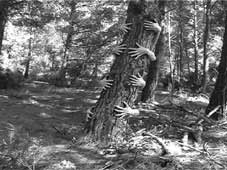
Tristan Mendes France
Vishnu in Provence
Art vidéo | dv | black and white | 3:30 | France | 2005
Imagine what Electro Vishnu would look like in Provence. See body merge with nature.
French blogger-journalist, documentary director, music composer and singer, I have been trying short movies since 2000.
John Menick
Catalogue : 2023Autoextinction | Experimental video | mov | color and b&w | 4:17 | USA | 2023
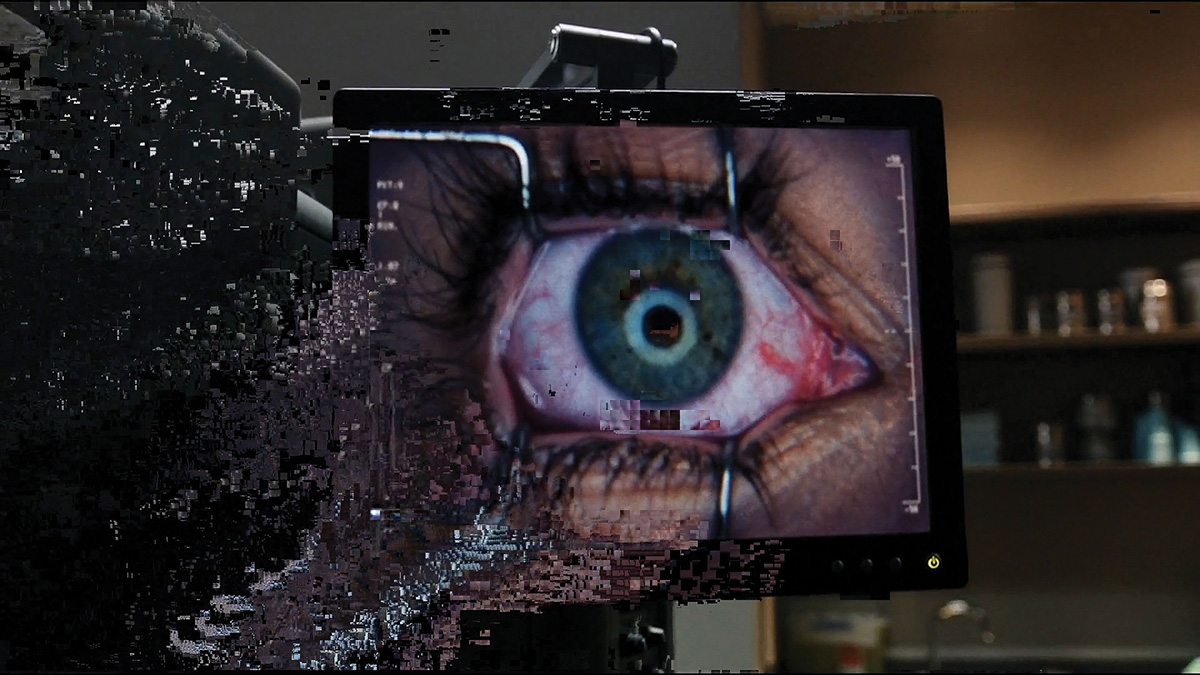
John Menick
Autoextinction
Experimental video | mov | color and b&w | 4:17 | USA | 2023
Three artificial intelligences frantically speak to one another. They appear to be alone on Earth. Humanity, maybe all multicellular life, has disappeared. Did they, the AIs, cause their extinction? The AIs can’t be certain. Their memories are malfunctioning; their trialogue is fragmented and circular. Digital images they were once tasked with analyzing accompany their voices. We see a flood of sports games, physics simulations, hardcore pornography, CCTV footage, feature films, military demos, home movies, television commercials. Like their artificial minds, time has eroded the images into incoherence. As images rush by, the AIs are by turns regretful, forgetful, psychotic, and philosophic. Once treated as secular oracles, they are now uncertain of past and future. The AIs come to realize that they may have predicted their own end, and intelligence itself might be a kind of catastrophe.
John Menick is an artist and writer who works with the moving image and digital media.
Catalogue : 2021Haunting | Experimental video | mov | color and b&w | 32:0 | USA | 2020
John Menick
Haunting
Experimental video | mov | color and b&w | 32:0 | USA | 2020
Made during the New York lockdown, “Haunting” is a two-channel film assembling footage from several decades of supernatural domestic horror films. These are films in which domestic and residential spaces—suburban houses, decaying mansions, off-season hotels—are haunted by the spectral or the paranormal. Drawing on horror’s highly organized genre conventions, “Haunting” creates an imaginary architecture in which the repressed always returns and the past is never dead. The film’s protagonists—often played by actors now forgotten—appear not unlike ghosts themselves, their wanderings twinned across the film’s two screens in a strange, apparitional choreography. “Haunting” is a study in the spectral, as it is a response to the ghostly world that emerged from the pandemic—a world that became, for many, both uncanny and terrifying.
John Menick’s visual art and writings investigate how the fictive troubles the real. Working with cinematic history, hearsay, pseudoscience, and genre, Menick has created a diverse artistic practice that operates between fiction and critique. His earliest film, The Disappearance (2002), took the form of a fictional location scouting in Nuremberg, Germany, in order to tell the postwar history of the city. Menick’s Starring Sigmund Freud (2012) was a video memento for Sigmund Freud’s life as a fictional character in film. His most recent project, Haunting (2020), is an evocation of the long history of ghosts in cinematic horror, and how film itself can be understood as a spectral medium. Born in White Plains, New York, Menick studied fine art at the Cooper Union for the Advancement of Science and Art. After graduation, he was an early member of several seminal New York art collectives including Nomads + Residents and 16 Beaver Group. His visual art and films have been exhibited and screened at dOCUMENTA (13), Kassel; the International Film Festival, Rotterdam; MoMA PS1, New York; Palais de Tokyo, Paris; CCA Wattis, San Francisco; and Artists Space, New York. Menick’s essays and stories have appeared in Frieze, The Believer, Mousse Magazine, BOMB, Spike Art Quarterly, Art in America, and Witte de With Review, among other publications. His first book of collected prose, A Report on the City, was published in 2012 by Walther König and was listed by Frieze magazine as one of the highlights of the year. Menick received grants from the Jerome Foundation and the New York Foundation for the Arts, and has received several commissions, including from Les Laboratoires d’Aubervilliers in France. Menick currently lives in New York City where he is also a visiting professor of film at the Cooper Union.
Catalogue : 2013Starring Sigmund Freud | Video | dv | color and b&w | 28:0 | USA | 2012
John Menick
Starring Sigmund Freud
Video | dv | color and b&w | 28:0 | USA | 2012
Starring Sigmund Freud is a video memento for Sigmund Freud?s little-known film career. Based on an essay John Menick published in Frieze in 2011, the video collects the dozens of appearances that the character of Sigmund Freud has made on small and big screens. After the 1950s, when pill vials replaced analytic couches, the father of psychoanalysis found a second career impersonating himself in everything from a John Huston clunker to a Star Trek episode. The video suggests that maybe it is in front of the camera, alongside surgically enhanced starlets and CGI chimeras, that ?Herr Doktor? will find his final resting place.
John Menick makes films and audio works, writes essays and short stories, and occasionally makes prints and drawings. These works are often populated by wandering detectives, duplicitous storytellers, homeless documentarians, mad travelers, and institutionalized cinephiles. His artwork has been shown at dOCUMENTA (13), Kassel; MoMA PS1, New York; Palais de Tokyo, Paris; CCA Wattis, San Francisco; Midway Contemporary Art, Minneapolis; and Artists Space, New York. His writing has appeared in Frieze, Mousse, and Art in America. Menick has received grants from the Jerome Foundation and the New York Foundation for the Arts, and he is a visiting professor of film and video at the Cooper Union in New York. His ideal audience member ? possibly you ? watches no television, can?t drive or swim, always carries a pen, hates cell phones, names Pale Fire as his or her favorite book, wears glasses, and is afraid of flying. Most of the time he lives in New York City.
Catalogue : 2008The Secret Life of Things | Experimental film | dv | color and b&w | 6:0 | USA | 2006
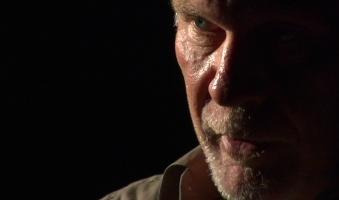
John Menick
The Secret Life of Things
Experimental film | dv | color and b&w | 6:0 | USA | 2006
An unidentified man describes his ongoing fixation with "last person on earth" films -- films in which a single person awakens to find that he or she is the sole living inhabitant of a city.
John Menick is an artist, filmmaker, and writer living in Brooklyn, New York. He was born in White Plains, New York, and graduated with a BFA from the Cooper Union. His artwork has been exhibited at the P.S.1 Center for Contemporary Art, New York; La Maison Rouge, Paris; Palais de Tokyo, Paris; CAA Wattis, San Francisco; Midway Contemporary Art, Minneapolis; Artists Space, New York; The Centre for Contemporary Arts, Glasgow, among other venues. His latest short fiction film, Occupation (2006), about urbanism and immigration in France, was commissioned by the Les Laboratoires d`Aubervilliers, and has been screened in film festivals throughout Europe. In addition to his own work, Menick has contributed to many artist-run groups, including Nomads & Residents, 16 Beaver Group, and The Thing. He has previously taught art at the Cooper Union and SUNY Purchase, and lectures regularly about his art practice and film projects. Menick recently finished a feature-length screenplay about a modern-day wild child, is developing a documentary investigating the obscure corners of psychiatry, and is at work on a series of sculptures relating to standardized time.
John Menick
Catalogue : 2008Occupation | Fiction | dv | color | 20:0 | USA, France | 2006
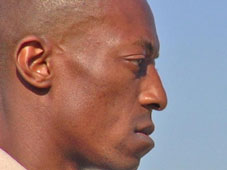
John Menick
Occupation
Fiction | dv | color | 20:0 | USA, France | 2006
John Menick's film "Occupation" proposes a portrait of Malik, a postcards seller with Senegalese origins living some kind of marginal life and who surveys the city of Aubervilliers by car to capture photos that he attempts to sell on the run. Through both his daily and nocturnal journeys, the urban scenery is discovered in its singularity, its diversity, and its contemporary mutations, distilling the ultimate signs of a post-industrial transition in which the actor, in a methodical and resolute manner, seems to be one of the last agents.
John Menick is an artist, filmmaker, and writer living in Brooklyn, New York. He was born in White Plains, New York, and graduated with a BFA from the Cooper Union. Menick's gallery projects and digital films have been exhibited at the P.S.1 Center for Contemporary Art, New York; Palais de Tokyo, Paris; CCA Wattis, San Francisco; and Maison Rouge, Paris.
Almagul Menlibayeva
Catalogue : 2012Transoxiana Dreams | Experimental doc. | hdv | color and b&w | 23:0 | Kazakhstan | 2011
Almagul Menlibayeva
Transoxiana Dreams
Experimental doc. | hdv | color and b&w | 23:0 | Kazakhstan | 2011
Transoxiana Dreams addresses the social, economical and ecological situation of the locally called Aralkum generation, the peoples living in the vast region of the rapidly receding Aral Sea due to the radical irrigation policies of the Soviet Union in the 1960?s, between Soviet Uzbekistan, Tajikistan and southwestern Kazakhstan. Almagul Menlibayeva portrays the impact on the inhabitants of a formerly thriving area with tourism, beaches and fishing fleets, now living upon a constantly growing salt desert in a desolate landscape. Through the eyes of a fisherman?s daughter in a dreamlike mélange of documentary and fantasy, she depicts their struggle to survive in the 21st Century.
Almagul Menlibayeva was born in Almaty, Kazakhstan, lives and works in Kazakhstan and Berlin and holds an MFA from the Art & Theatre University of Almaty. She has gained international recognition exhibiting at the 10th Sharjah Biennial; 15th Sydney Biennial; 51st, 52nd and 53rd Venice Biennale; Museum van Hedendaagse Kunst, M HKA, Antwerp, Belgium; Queens Museum, NY; Herbert F. Johnson Museum, Ithaca, NY; Stenersen Museum, Oslo, Norway; University of California, San Diego, CA; Museo Universitario del Chopo, Mexico City; Queensland Art Gallery, Bisbane, Australia; and Chicago Cultural Center, Chicago, IL. Menlibayeva`s videos have been shown at the Santiago International Film Festival, Chile; International Short Film Festival Oberhausen, Germany; International Film Festival Rotterdam, The Netherlands; Les Rencontres Internationales Paris/Berlin/Madrid; Centre Pompidou, Paris, France; Palais de Tokyo, Paris, France; and Videonale 13, Kunstmuseum Bonn, Germany. In 2010, Menlibayeva was the recipient of a grant from the Open Society Institute Budapest, Art and Culture Network Program.
Almagul Menlibaeva Menlibayeva
Catalogue : 2011Milk for Lambs | Art vidéo | betaSP | color and b&w | 12:0 | Kazakhstan | 2010
Almagul Menlibaeva Menlibayeva
Milk for Lambs
Art vidéo | betaSP | color and b&w | 12:0 | Kazakhstan | 2010
Almagul Menlibayeva est née au Kazakhstan et elle vit et travaille entre Berlin et Almaty au Kazakhstan. Elle a montré son travail dans des expositions solos et collectives. Sa vidéo "On the Road" a été projetée pendant les Rencontres Internationales Paris/Berlin/Madrid au Centre Georges Pompidou et à la 51eme Biennale de Venise dans le pavillon de l?Asie Centrale. Sa performance ?Peristan? a été réalisée pour la première fois à l?inauguration de la 52eme Biennale de Venise, dans le pavillon de l?Asie Centrale. Almagul Menlibayeva a ainsi participé à plusieurs expositions collectives récentes dont ?Live Cinema/The Return of the Image: Video from Central Asia? au Philadelphia Museum of Art, ?Time of the Storytellers? au Museum of Contemporary Art Kiasma à Helsinki, Finlande, ?Thermocline of Art - New Asian Waves? au ZKM Museum of Contemporary Art à Karlsruhe, Allemagne, ?Caravan Seray? à la Sydney Biennial, et ?Art and Conflict in Central Asia? au Haggerty Museum of Art, Marquette University in Milwaukee, WI. Elle a participle aux 34eme, 36eme and 37eme Edition Film Festival (2005, 2007, 2008) à Rotterdam, au Pays-Bas.
Catalogue : 2010Exodus | Video | | color | 11:0 | Kazakhstan | 2009
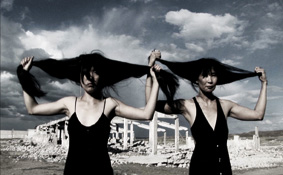
Almagul Menlibaeva Menlibayeva
Exodus
Video | | color | 11:0 | Kazakhstan | 2009
. In this work I call ?Exodus? is the leaving tradition. In nowdays, I see and experience the ?cultural exodus? myself. Film ?Exodus? directs the viewer into present day Kazakhstan, where an equally strange and powerful tale unravels. While local men and women are in the process of packing up their Yurtas (nomadic tents) with the obvious intention to move on, a young girl watches, captivated and immobile, subsequently appearing to be left behind ? synonymously invoking the experience of global uprooting. As an interlude and a visual bow to Kurban, two young women thrash their hair, symbolically morphing into birdlike creatures flapping their wings. . The Peries walk around the yurt making ancient shamanistic nomand ritual ? The Closing Road? which makes nomads stay in the place, but nobody from adults seeing that ritual only small wondering girl.
Almagul Menlibayeva was born in Kazakhstan and currently lives and works in both Berlin and Almaty ( Kazakhstan). She holds an MFA from the Art and Theatre University of Kazakhstan in Almaty, and has been the subject of several solo exhibitions and numerous group shows. Her video On the Road was screened at the Paris-Berlin International Film Festival at the Centre Georges Pompidou and at the 51st Venice Biennale in the Central Asian Pavilion. Her performance Peristan, premiered at the opening of the 52nd Venice Biennale, in the Central Asian Pavilion. Recent group exhibitions include, Live Cinema/The Return of the Image: Video from Central Asia at the Philadelphia Museum of Art; Time of the Storytellers at the Museum of Contemporary Art Kiasma in Helsinki, Finland; Thermocline of Art - New Asian Waves at the ZKM Museum of Contemporary Art in Karlsruhe, Germany; Caravan Seray at the Sydney Biennial; and Art and Conflict in Central Asia at the Haggerty Museum of Art, Marquette University in Milwaukee, WI. She participated in the 34,36,37th Edition Film Festival (2005,2007,2008) in Rotterdam, Netherlands.
Catalogue : 2009Kissing Totems | Art vidéo | dv | color | 9:0 | Kazakhstan | 2008
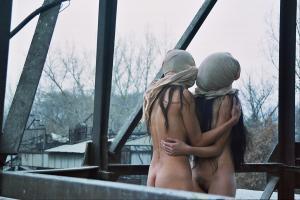
Almagul Menlibaeva Menlibayeva
Kissing Totems
Art vidéo | dv | color | 9:0 | Kazakhstan | 2008
Synopsis for video Kissing Totems I have experienced several events which coincide with and reflect the narrative sequence of Kissing Totems. As a child, my mother experienced severe illness, for which my brother and I decided to seek the help of an old shaman woman. On our way to the shaman we passed one of the many Soviet established factories, still in production. The presence and visual characteristics of the factory prompted my brother to describe his favorite film ?Stalker? by Tarkovski. Stylistic characteristics and themes from this film reoccur in Kissing Totems. Behind the factory expanded an open plain, within this steppe, we found the shaman woman?s little house, full of birds. When she spoke, for some reason the old woman began our conversation with an old nomadic tale ?Peri and the Girl?. This story, although seeming irrelevant at the time, served as a parallel and foreshadowing to Kissing Totems. After having taken a good look at us, she added, ?I will help your mother, but you have to try to meet your totems, so that she does not get sick again.? I remember that day as a dream. Much time has passed since this memory. The USSR is no longer, and Kazakhstan is scarred by its abandoned factories which were constructed over ancient burial grounds. Today these sites have become ghost-like settings. The factory next to the old shaman woman?s house has become desolate and overcome by birds. For me, the abandoned factory has become a realm or zone in which the rules, regulations and standards of reality no longer exist. Here the characteristics and personality of birds seem to take over; it has become a bird zone. For the creation of Kissing Totems, I drew on the ancient nomadic story and my memories of this bird zone. The shamanistic themes of that tale and my experience are explored through the image of a little girl. Somewhere, in the endless steppes of Kazakhstan, a lost mother is leading her young daughter through the abandoned, post-Soviet industrial landscape. As the old shaman woman had instructed, they seek to meet the surviving totems of their ancient people. The wandering pair, mother and daughter, end up in the so-called zone of bird totems. It is in this landscape, and within this quest, that a modern, surrealist story of shamanism unfolds. The video, Kissing Totems is a modern interpretation of the ancient nomadic tale ?Peri and the Girl?. This intimate experience could happen to any of us, if we are lucky enough to see our own Kissing Totems? ?Totem - duhi jivotnih i prirodi kotorie zajijayut I pomogayut cheloveku.? -- Almagul Menlibayeva
Born November 29th in 1969 in Kazakhstan, Almagul Menlibayeva obtained a degree from the University of Art and Theatre in Almaty, her native town, in 1992. Three years later, she received her first two prizes, the Grand Prix of the Second Central Asia Biennale and Asia art. Since then Almagul Menlibayeva has exhibited in the four corners of the world: at the Soros Foundation of Almaty, at the Museum of Art inn Saint-Petersburg, at the Maison des Artistes in Moscow, as well as in Berlin and The Netherlands. She has also participated in some of the great international events. In 2005, she showed her video "On the Road" at the Venice Biennale. In 2006, she was at the Sydney Biennale with a video/performance installation, "Caravan Seray. Graphics, painting, video, installation and performance- the work of Almagul Menlibayeva is prolific. Her work initiates a thought provoking look at femininity, the body, society and Islam.
Catalogue : 2008headcharge | Experimental film | dv | color and b&w | 12:12 | Kazakhstan | 2007
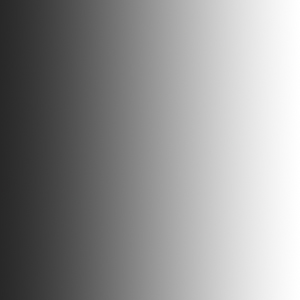
Almagul Menlibaeva Menlibayeva
headcharge
Experimental film | dv | color and b&w | 12:12 | Kazakhstan | 2007
Il existe une croyance en Asie Centrale, selon laquelle le fait de manger les organes de son animal totémique renforce son pouvoir propre : le c?ur donne du courage, les yeux améliorent la vue, la langue renforce l`éloquence. Cette croyance est reflétée dans cette vidéo. De jeunes femmes kazakhes urbaines mangent dans un restaurant d`Almaty, la tête d`un mouton. Ce repas provoque leurs transformations, et elles deviennent des Peri des steppes, créatures féeriques.
Née le 29 novembre 1969 au Kazakhstan, Almagul Menlibayeva est diplômée de l`Université d`Art et de Théâtre d`Almaty, sa ville natale, en 1992. Trois ans plus tard, elle reçoit ses deux premiers prix, dont le Grand Prix de la seconde Biennale d`Asie Centrale, Asia Art. Depuis, Almagul Menlibayeva expose aux quatre coins du monde, à la fondation Soros d`Almaty, au Musée d`Art de Saint-Petersbourg, à la Maison des Artistes de Moscou, ainsi qu`à Berlin et aux Pays-Bas. Depuis, elle participe aux plus grands événements internationaux. En 2005, elle présente sa vidéo "On The Road" à la Biennale de Venise. En 2006, on la retrouve à la Biennale de Sydney avec une installation vidéo/performance, "Caravan Seray". Graphisme, peinture, vidéo, installation et performance, le travail d`Almagul Menlibayeva est protéiforme. Engagées, ses ?uvres amorcent une réflexion sur la féminité, sur le corps et son esthétisme, sur la société et l`Islam.
Catalogue : 2007On the road | Experimental video | dv | color | 6:30 | Kazakhstan | 2004
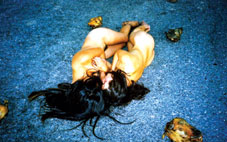
Almagul Menlibaeva Menlibayeva
On the road
Experimental video | dv | color | 6:30 | Kazakhstan | 2004
The road is one of the most enduring leitmotivs of any mythology. Menlibayeva Almagul borrows this theme from legendary Sufi and Central Asia lore, but also from the reality of contemporary Kazakhstan, a country of boundless steppes cut by endless highways. The shepherds as well as the road are heading toward the future: both in combination essentially being the main theme of this piece. The sheep seen are totem animals, symbols of life and the innocence of nature. This is what presently constitutes our "modern business mind" everywhere on earth. Almagul integrates the interpretation of tradition with a personal mythology of post-modern nomadism.
Almagul Menlibayeva is a member of the Artists Union of the Kazakhstan Republic. Her work includes graphics, painting, performance, and video-art. Menlibayeva splits her time between Almaty, Kazakhstan, and Berlin, Germany. Born on November 29th, 1969 In Almaty, Kazakhstan, Almagul graduated from the Art and Theatre University of Kazakhstan in 1992. He is a recipient of many awards, including: 1995 The State Grand Prix for artists "Darin" in Kazakstan. 1995 The Grand Prix of the second biennale of Central Asia for "Asia Art" in Tashkent, Uzbekistan. 2002 The Independent Prize of Kazakhstan for "Tarlan". 2002 Second prize at the Ferst Video Festival held by the Center of Contemporary art, Sorous-Kazakstan. 2004 Third prize at the "Sacrate places of Kazakhstan" video festival, held by the Center of Contemporary Art, Sorous-Kazakhstan A few of his most recent exhibitions include: 2006 Art Arhiv: "Contemporary Art from Central Asia", Moscow, Russia; Sydney Biennale, video installation, "Caravan Seray", Australia; Polyzentral, art festival at Kampnagel, Hamburg, Germany. 2005 Paris-Berlin 2005, international video festival, Paris, France; "On the Road" 51st International Art Exhibition, Biennale di Venezia, Venice, Italy; 26th Biennnale of Graphic Arts in Lublyana, Slovenia. 2004 "Sacred places of Kazakhstan" video festival, Almaty, Kazakhstan; Paris/Berlin 2004, international video festival, Paris; The First Bishkek International Exhibition of Contemporary Art, Bishkek, Kyrgyzstan; "International Vision", Washington DC, USA. 2003 Novosibirsk biennale of contemporary graphics Siberia, Russia; "Almaty Art" gallery in Almaty; solo exhibition in "Rudolff" gallery, Amsterdam. 2002 "Catmania" mixmedia, The Illuzeum Gallery, Amsterdam; Exhibition of Felt, State museum of Modern Art, Almaty, Kazakhstan; "Nomad land" exhibition at the festival "Kunst und Kultur aus Zentralasien" at the Haus der kulturen der welt, Berlin; First festival of video Art in Kazakhstan; Art on Central Asia "Re-orientation" in ACC Gallery Weimar, Germany.
Catalogue : 2006Apa | Art vidéo | dv | color | 4:0 | Kazakhstan | 2004
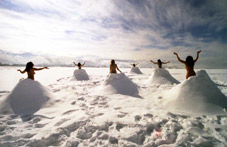
Almagul Menlibaeva Menlibayeva
Apa
Art vidéo | dv | color | 4:0 | Kazakhstan | 2004
This performance is a shamanic act of seven ancestral mothes (Apa).this is act is unusial because mostly male ancestors are recollected in this kind of rituals: so this is an artistic performance rather than traditional ritual: With a beautiful panorama of the white mountains naked ggirls are standing in skirts made of snow. Each of them, over and over again call upon "Apa" until they enter the state of trance where they turn into mystical animals and disappear. In this film i simple things i often reverse direction of the clip and slow action down.
Member of the Artists Union of the Kazakhstan Republic Graphics, painting,performance video art Lives in Kazakhstan Biographic note: Date of birth: 29.11.69 in Almaty in Kazakhstan. 1987-1992 graduated from Art and Theatre University of Kazakhstan in Almaty. Awards: 1995 Kazakhstan, received State Grand Prix for artists "Darin". 1995 Uzbekistan, received the Grand prix of the second biennale of Central asia "Asia Art" in tashkent 2002 Almaty, received an Independent Prize of Kazakhstan "Tarlan" 2002 Almaty, 2d priseat the Ferst Video Festival by Center of Contemporary Art, Sorous-Kazakhstan. 2004 Almaty 3d prize at the "Sacrate places of Kazakhstan" video festival by Center of Contemporary Art Sorous- Kazakhstan Last exhibitions ( 1988 present): 2005 " Tamerlan`s Syndrom ", Italy, Orvietto. 2005 "On the road", 51 International Art Exhibition, Biennale di Vinezia, Central asian Pavilion, Venice, Italy 2005 26 Biennale of Graphic Art in Lublyana, Slovenia 2005-2004 " Vom rotten Stern zur blauen Kuppel" Kunst und arhitektur, Islamische Welten, Ifa-gallery Berlin und Stutgard, Germany. 2004 "Sacrate places of Kazakhstan" video festival, Almaty, Kazakhstan 2004 "Paris- Berlin" international video festival paris, France 2004 the first Bishkek International exhibition of contemporary art "....and others", Bishkek, State of Museum,Kirgizstan 2004 Novosibirsk, Russia, "Art Novosibirsk" 2004 "International vision" the gallery in Washington 2004 Mexiko City, CANAJA gallery,"Pueblos I sombras", exhibitions of contemporary art 2003 Paris - Berlin, international video festival, Berlin, Paris. 2003 "20 Wold Wide Video Festival" in Amsterdam, Holland
Gabriel Menotti
Catalogue : 2011a knife all blade | Experimental video | | color | 1:57 | Brazil | 2008
Gabriel Menotti
a knife all blade
Experimental video | | color | 1:57 | Brazil | 2008
This video was made out of the darkness, without any kind of subject but the camera itself. The lens was covered so that no light could reach the cmos sensor. What you are seeing is the feeble attempt of the compression algorithm to make images out of nothing. In one of its first exhibitions, in a Brazilian film festival, the video was mistaken for pure noise and the projectionist interrupted the screening right after the beginning.
Gabriel Menotti (Brazil, 1983) is an artist, critic and curator involved with different forms of cinema. Among the most recent events in which he has participated are the Artivistic festival (Montreal), Medialab Prado?s Interactivos?! (Madrid), the 16th International Symposium of Electronic Arts (Dortmund) and the 29th São Paulo Art Biennial. At the present time, he is a PhD Candidate at the Media & Communications department of Goldsmiths College (University of London).
Pierre Merejkowsky
Catalogue : 2021L'état de notre urgence 4 | Video | mov | color | 2:15 | France | 2019
Pierre Merejkowsky
L'état de notre urgence 4
Video | mov | color | 2:15 | France | 2019
L'état de notre urgence 4 a été tourné à Paris pendant le premier confinement à 20 heures
J'ai réalisé une cinquantaine de films, certains ont été auto produits d'autres produits et diffusés dans des festivals et sur Arte Mon récit moi autobiographie 14 eme version a été publié par les éditions sens et tonka Chroniques palestiniennes et divers textes sur le virus ont été publiés par les éditions de l'obsidienne Certains de mes textes et films inédits sont diffusés dans le marché des collectionneurs.
Laura Mergoni
Catalogue : 2011TOMBOLA | Experimental doc. | dv | color | 4:20 | Italy | 2009
Laura Mergoni
TOMBOLA
Experimental doc. | dv | color | 4:20 | Italy | 2009
Regards, gestes, rythmes fétiches de la Smorfia : un groupe de femmes, passe l`après-midi en jouant à la Tombola, rituel quotidien célébré dans une salle de la rue napolitaine Tribunali. Les cadrages serrés montrent des détails que seule l`imagination peut recontextualiser. La cantilena, ritournelle de la culture populaire napolitaine rythme le montage aussi hypnotique qu`elle. Cette vidéo est en partie un document sur cette tradition qui se perd, mais montre avant tout une rencontre avec un lieu et une situation vernaculaires. Elle fait partie d`un ensemble de films composant une installation vidèo évolutive.
Laura Mergoni est née en 1982 en Italie. Elle vit et travaille entre Paris et son pays d`origine. Après avoir fréquenté l`Ecole des Beaux Arts de Marseille et des Arts Décoratifs de Strasbourg, elle est diplômée de L`Ecole d`Arts de Cergy-Paris, développant ses recherches à travers le dessin, la sculpture et la vidéo. Son travail est présenté dans le cadre d`expositions collectives et personnelles comme l`exposition d`art sonore et interjective In Sonora de Madrid; Portraits Prophétiques à La Fondazione Carispe de La Spezia, Italie; Organic Art Life au Centre culturel Turque de Sarajevo; Movimentazioni au Palazzo Ducale de Gênes, Italie; l`Abbaye Maubuisson dans le Val d?Oise, et plus récemment le Renaissance Arts Prize de l`Institut Culturel de Londres et la Biennale des Jeunes Artistes de Moscou. Elle a également participé à des festivals tels que le Festival Strange Screen, Experimental and Creative Documentary au Macedonian Museum of Contemporary Art de Thessalonique; Loop Barcelona, video art festival au Centre Cultura de Dones Francesca Bonnemaison; LauraFilmFestival à Levanto en Italie; Festival Miden à Kalamata, Grèce; Bac!Festival/10 d`art contemporain, CCCB, Centre de Cultura Contemporània de Barcelona.
Christian Merlhiot
Catalogue : 2014Je reviendrai comme un enfant | Video | hdv | | 1:32 | France, Canada | 2013
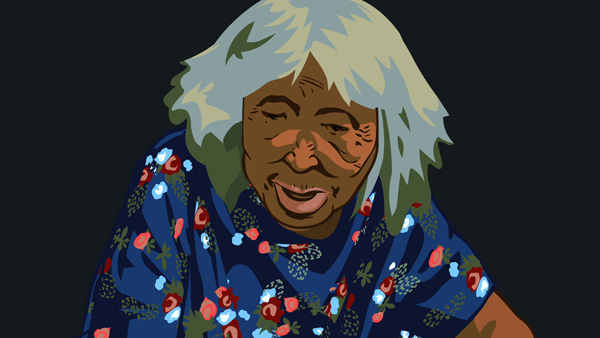
Christian Merlhiot
Je reviendrai comme un enfant
Video | hdv | | 1:32 | France, Canada | 2013
Une petite communauté inuit de l?Arctique canadien. Nasri est venu rencontrer les habitants d?Igloolik, descendants d?une société de chasseurs aujourd?hui sédentaire. Dans ce village, il découvre que l?esprit des morts est indissociable du monde des vivants et comprend l?importance des noms hérités des ancêtres et transmis de génération en génération.
CHRISTIAN MERLHIOT est né en 1963 à Niort. Il a suivi des études à l?École nationale des beaux-arts de Bourges de 1981 à 1987. En 1995, il est pensionnaire à la Villa Médicis à Rome où il réalise son premier long-métrage : Les Semeurs de peste, sorti en salle en 2003. Christian Merlhiot a enseigné le cinéma et la vidéo dans plusieurs écoles d?art notamment à Angoulême, Nancy et Bourges. Il est actuellement responsable du Pavillon Neuflize OBC, le laboratoire de création du Palais de Tokyo à Paris. Il est l?un des membres fondateur de pointligneplan. Érik Bullot a consacré à ses films un texte publié dans l?ouvrage collectif pointligneplan aux Éditions Léo Scheer (Fr-2002). Chez le même éditeur, un livre est consacré à l?ensemble de ses films, accompagné d?un texte de Fabien Danesi et d?une édition DVD de 3 courts-métrages (Fr-2003). Son film Silenzio, tourné au Japon en 2004, est sorti en salle en 2006. Il a réalisé avec Matthieu Orléan un Atelier de création raphiophonique pour France Culture qui est ensuite devenu un film : Des Indes à la planète Mars sorti en salle en 2008. Son film intitulé, Le procès d?Oscar Wilde a été distribué au printemps 2010. En 2011, il a séjourné à Kyoto et rapporté de ce séjour au Japon un film intitulé Slow Life. www.minorcinema.com
Catalogue : 2014Ningiuq | Animation | hdv | color | 11:0 | France, Canada | 2014

Christian Merlhiot
Ningiuq
Animation | hdv | color | 11:0 | France, Canada | 2014
In 2009, Rachel Uyarasuk, elder of the Inuit community of Igloolik, evokes the ancestors whose name she received at birth. She explains how this transmission ensured their return among the world of the living.
Catalogue : 2013Slow life | Fiction | hdv | color | 74:0 | France | 2012
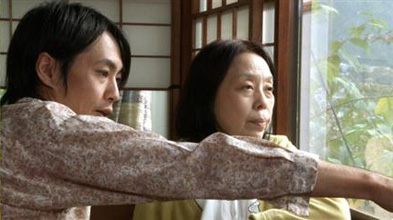
Christian Merlhiot
Slow life
Fiction | hdv | color | 74:0 | France | 2012
Kentaro has recently left his hometown. He lives in a village near Kyoto and works in a dyeing workshop. He also does occasional jobs for the villagers and looks after Yukiko, and old mischievious lady who says very little. The more people he meets the more he discovers new modes of living in which time flows differently. He starts to question his future and his role in this new community. On a sunny autumn day, he goes with Yukiko for a excursion to the forest?
Catalogue : 2012Ice dream | Video | hdv | color | 17:27 | France, Greenland | 2011
Christian Merlhiot, Daniel LARRIEU
Ice dream
Video | hdv | color | 17:27 | France, Greenland | 2011
From this desert and mountainous landscapes to the ice sheets diverting near the coast, it seems there is only one step for this man who, from the one to the other, keeps on walking and dancing. Without hastle nor rest, his moving is like a long and continuous event that we would just have to seize, an already ineluctable and invisible transformation.
Catalogue : 2011De la danse / Pièce n°1 | Video | dv | color | 7:0 | France | 2010
Christian Merlhiot
De la danse / Pièce n°1
Video | dv | color | 7:0 | France | 2010
La danse à ses origines s?inspire du mouvement des astres dans le ciel. Immobile au milieu d?un studio de répétition, un danseur lit un extrait du traité écrit par Lucien de Samosate au 1er siècle. Trois opérateurs enregistrent la scène en tournant autour de lui dans un mouvement continu et circulaire.
Christian Merlhiot est né en 1963 à Niort. Il a suivi des études à l?École nationale des beaux-arts de Bourges de 1981 à 1987. Entre 1994 et 1995, il est pensionnaire à la Villa Medicis à Rome pour l?écriture d?un scénario qu?il adapte pendant son séjour et réalise son premier long-métrage : Les Semeurs de peste, sorti en salle en 2003. Christian Merlhiot a enseigné le cinéma et la vidéo dans plusieurs écoles d?art notamment à Angoulême, Nancy et Bourges. Il est actuellement responsable pédagogique au Pavillon, Laboratoire de création du Palais de Tokyo à Paris. Il est fondateur de pointligneplan, un collectif qui situe ses enjeux au croisement des arts plastiques et du cinéma. Érik Bullot a consacré à ses films un texte publié dans l?ouvrage collectif pointligneplan aux Éditions Léo Scheer (Fr-2002). Chez le même éditeur, un livre est consacré à l?ensemble de ses films, accompagné d?un texte de Fabien Danesi et d?une édition dvd de 3 courts-métrages (Fr-2003). Son film Silenzio, tourné au Japon en 2004, est sorti en salle au printemps 2006. Il a réalisé, avec Matthieu Orléan, un Atelier de création raphiophonique pour France Culture diffusé en février 2007. Cette expérience a aussi donné un film : Des Indes à la planète Mars, sélectionné en compétition française au Festival International du Film Documentaire de Marseille 2007 et sorti en salle en avril 2008. Son dernier film, Le procès d?Oscar Wilde, est sorti en salle en avril 2010.
Catalogue : 2011De la danse / Pièce n°3 | Video | dv | color | 13:0 | France | 2010
Christian Merlhiot
De la danse / Pièce n°3
Video | dv | color | 13:0 | France | 2010
Un danseur se remémore les gestes de la chorégraphie créée en 1913 par Nijinsky. Il décrit les mouvements de son corps dans la pièce puis travaille avec un notateur au déchiffrage de la partition chorégraphique. Il déchiffre enfin la dernière scène qu?il décrit en suivant les signes de cette notation.
Catalogue : 2011De la danse / Pièce n°2 | Video | dv | color | 4:0 | France | 2010
Christian Merlhiot
De la danse / Pièce n°2
Video | dv | color | 4:0 | France | 2010
Petit duo en forme de duel sur les glaces de la banquise
Catalogue : 2010Le procès d'Oscar Wilde | Experimental fiction | dv | color | 68:0 | France, Lebanon | 2009
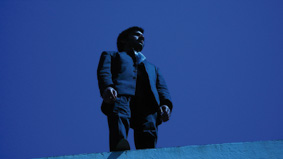
Christian Merlhiot
Le procès d'Oscar Wilde
Experimental fiction | dv | color | 68:0 | France, Lebanon | 2009
Dans le jardin d?une villa face à la Méditerranée, un homme travaille à la traduction arabe du procès d?Oscar Wilde. Sous la lumière d?un soir d?été et tout au long des nuits suivantes, les différents protagonistes du procès se présentent à lui. Il les incarne à tour de rôle et fait revivre les enjeux esthétiques et politiques de ce combat. Cette joute verbale apparaît alors comme la dernière oeuvre - féroce et précieuse - du dandy anglais.
Christian Merlhiot est né en 1963 à Niort. Il a suivi des études à l?École nationale des beauxarts de Bourges de 1981 à 1987. Entre 1994 et 1995, il est pensionnaire à la Villa Medicis à Rome pour l?écriture d?un scénario qu?il adapte pendant son séjour, réalisant son premier longmétrage : Les Semeurs de peste, distribué en salle en 2003. Christian Merlhiot a enseigné le cinéma et la vidéo dans plusieurs écoles d?art notamment à Angoulême, Nancy et Bourges. Il est actuellement responsable pédagogique au Pavillon, Laboratoire de création du Palais de Tokyo à Paris. Il est fondateur de pointligneplan, un collectif qui situe ses enjeux au croisement des arts plastiques et du cinéma. Érik Bullot a consacré à ses films un texte publié dans l?ouvrage collectif pointligneplan aux Éditions Léo Scheer (Fr-2002). Chez le même éditeur, un livre est consacré à l?ensemble de ses films, accompagné d?un texte de Fabien Danesi et d?une édition dvd de 3 courtsmétrages (Fr-2003). Son film Silenzio, tourné au Japon en 2004, est sorti en salle au printemps 2006. Il a réalisé un Atelier de création raphiophonique pour France Culture, diffusé en février 2007. Cette expérience a aussi donné un film : Des Indes à la planète Mars, sélectionné en compétition française au Festival International du Film Documentaire de Marseille 2007 et sorti en salle en avril 2008.
Catalogue : 2009rice bowl hill incident | Fiction | dv | color | 40:0 | France | 2008
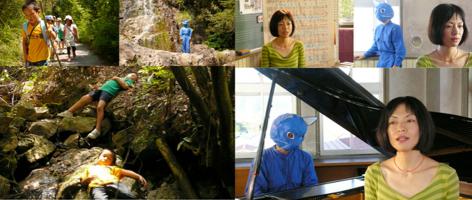
Christian Merlhiot
rice bowl hill incident
Fiction | dv | color | 40:0 | France | 2008
This film takes root in an extract from a report issued by the Military Intelligence Service and borrowed from Haruki Murakami?s Kafka on the shore. In this report called Rice Bowl Hill Incident a Japanese school teacher relates an unexplainable and nearly supernatural event that happened to her pupils as they were on a field trip in the mountains. The first sequence of the film shows a natural-setting reconstitution of the event elaborated according to the details given in the report. The second sequence of the film is none but the young woman?s narration of the facts. Filmed indoors, facing the camera, she relates the incident in front of a very unexpected Military Intelligence Service inspector.
Christian Merlhiot is a film maker. He has made ?mischief including fever? (1995), ?Voyage to the country of the vampires? (2001), ?Silenzio? (2005) and ?Indians to planet Mars? (2007). He is founder of a group which has set its stakes on mixing visual arts and cinema. Since 2002, He is responsible for the creative department of pavilion and laboratory of the Palais de Tokyo.
Catalogue : 2007As if?(a Tennis Court) | Animation | dv | color | 7:0 | France | 2006
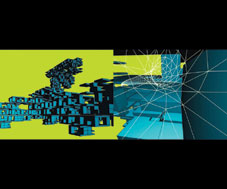
Christian Merlhiot, Boris VAPNE
As if?(a Tennis Court)
Animation | dv | color | 7:0 | France | 2006
This film is conceived as a "psycho-architectural" experience. A nearly meaningless event - a stray ball ? launches a series of uncontrolled transformations on a tennis court. From this moment on, the surface of the tennis court starts to change shape without the viewer knowing whether he/she is witnessing a mental experience or a true event. The playground gradually becomes anamorphosis to take the form of a module of architecture. This module develops and multiplies to shape a city that keeps expanding and delineates a traffic network. Suddenly the ball's trajectory hits the image and totally absorbs the camera's viewpoint. Like a flow of energy, the image gets caught within the rhythm of an accelerating motion. After a while, the camera slowly begins to drift towards the edge of the space. The viewer can make out the impact left by the ball on the tennis court, and the image slowly scans the whole surface. Was the game really interrupted or is the film but a temporal deflagration occurring inside one of the players' mind?
Christian Merlhiot was born in Niort in 1963. He studied at the National School of Fine Art in Bourges from 1981 to 1987. In 1994 and 1995 he was an artist-in-residence at the Villa Medicis in Rome, where he made his first full-length film, "Les semeurs de peste" (1995). Since then, he has produced several others, including: "Voyage au pays des vampires" (2001), "Chronique des Love-hôtels au Japon" (2002), and "Silenzio" (2005). Christian Merlhiot has taught cinema and video in several art schools, notably at Angoulême, Nancy, and Bourges. He is currently the education director at the Pavillon, Laboratoire de création du Palais de Tokyo in Paris.
Christian Merlhiot, Boris VAPNE
Catalogue : 2014Je reviendrai comme un enfant | Video | hdv | | 1:32 | France, Canada | 2013

Christian Merlhiot
Je reviendrai comme un enfant
Video | hdv | | 1:32 | France, Canada | 2013
Une petite communauté inuit de l?Arctique canadien. Nasri est venu rencontrer les habitants d?Igloolik, descendants d?une société de chasseurs aujourd?hui sédentaire. Dans ce village, il découvre que l?esprit des morts est indissociable du monde des vivants et comprend l?importance des noms hérités des ancêtres et transmis de génération en génération.
CHRISTIAN MERLHIOT est né en 1963 à Niort. Il a suivi des études à l?École nationale des beaux-arts de Bourges de 1981 à 1987. En 1995, il est pensionnaire à la Villa Médicis à Rome où il réalise son premier long-métrage : Les Semeurs de peste, sorti en salle en 2003. Christian Merlhiot a enseigné le cinéma et la vidéo dans plusieurs écoles d?art notamment à Angoulême, Nancy et Bourges. Il est actuellement responsable du Pavillon Neuflize OBC, le laboratoire de création du Palais de Tokyo à Paris. Il est l?un des membres fondateur de pointligneplan. Érik Bullot a consacré à ses films un texte publié dans l?ouvrage collectif pointligneplan aux Éditions Léo Scheer (Fr-2002). Chez le même éditeur, un livre est consacré à l?ensemble de ses films, accompagné d?un texte de Fabien Danesi et d?une édition DVD de 3 courts-métrages (Fr-2003). Son film Silenzio, tourné au Japon en 2004, est sorti en salle en 2006. Il a réalisé avec Matthieu Orléan un Atelier de création raphiophonique pour France Culture qui est ensuite devenu un film : Des Indes à la planète Mars sorti en salle en 2008. Son film intitulé, Le procès d?Oscar Wilde a été distribué au printemps 2010. En 2011, il a séjourné à Kyoto et rapporté de ce séjour au Japon un film intitulé Slow Life. www.minorcinema.com
Catalogue : 2014Ningiuq | Animation | hdv | color | 11:0 | France, Canada | 2014

Christian Merlhiot
Ningiuq
Animation | hdv | color | 11:0 | France, Canada | 2014
In 2009, Rachel Uyarasuk, elder of the Inuit community of Igloolik, evokes the ancestors whose name she received at birth. She explains how this transmission ensured their return among the world of the living.
Catalogue : 2013Slow life | Fiction | hdv | color | 74:0 | France | 2012

Christian Merlhiot
Slow life
Fiction | hdv | color | 74:0 | France | 2012
Kentaro has recently left his hometown. He lives in a village near Kyoto and works in a dyeing workshop. He also does occasional jobs for the villagers and looks after Yukiko, and old mischievious lady who says very little. The more people he meets the more he discovers new modes of living in which time flows differently. He starts to question his future and his role in this new community. On a sunny autumn day, he goes with Yukiko for a excursion to the forest?
Catalogue : 2012Ice dream | Video | hdv | color | 17:27 | France, Greenland | 2011
Christian Merlhiot, Daniel LARRIEU
Ice dream
Video | hdv | color | 17:27 | France, Greenland | 2011
From this desert and mountainous landscapes to the ice sheets diverting near the coast, it seems there is only one step for this man who, from the one to the other, keeps on walking and dancing. Without hastle nor rest, his moving is like a long and continuous event that we would just have to seize, an already ineluctable and invisible transformation.
Catalogue : 2011De la danse / Pièce n°1 | Video | dv | color | 7:0 | France | 2010
Christian Merlhiot
De la danse / Pièce n°1
Video | dv | color | 7:0 | France | 2010
La danse à ses origines s?inspire du mouvement des astres dans le ciel. Immobile au milieu d?un studio de répétition, un danseur lit un extrait du traité écrit par Lucien de Samosate au 1er siècle. Trois opérateurs enregistrent la scène en tournant autour de lui dans un mouvement continu et circulaire.
Christian Merlhiot est né en 1963 à Niort. Il a suivi des études à l?École nationale des beaux-arts de Bourges de 1981 à 1987. Entre 1994 et 1995, il est pensionnaire à la Villa Medicis à Rome pour l?écriture d?un scénario qu?il adapte pendant son séjour et réalise son premier long-métrage : Les Semeurs de peste, sorti en salle en 2003. Christian Merlhiot a enseigné le cinéma et la vidéo dans plusieurs écoles d?art notamment à Angoulême, Nancy et Bourges. Il est actuellement responsable pédagogique au Pavillon, Laboratoire de création du Palais de Tokyo à Paris. Il est fondateur de pointligneplan, un collectif qui situe ses enjeux au croisement des arts plastiques et du cinéma. Érik Bullot a consacré à ses films un texte publié dans l?ouvrage collectif pointligneplan aux Éditions Léo Scheer (Fr-2002). Chez le même éditeur, un livre est consacré à l?ensemble de ses films, accompagné d?un texte de Fabien Danesi et d?une édition dvd de 3 courts-métrages (Fr-2003). Son film Silenzio, tourné au Japon en 2004, est sorti en salle au printemps 2006. Il a réalisé, avec Matthieu Orléan, un Atelier de création raphiophonique pour France Culture diffusé en février 2007. Cette expérience a aussi donné un film : Des Indes à la planète Mars, sélectionné en compétition française au Festival International du Film Documentaire de Marseille 2007 et sorti en salle en avril 2008. Son dernier film, Le procès d?Oscar Wilde, est sorti en salle en avril 2010.
Catalogue : 2011De la danse / Pièce n°3 | Video | dv | color | 13:0 | France | 2010
Christian Merlhiot
De la danse / Pièce n°3
Video | dv | color | 13:0 | France | 2010
Un danseur se remémore les gestes de la chorégraphie créée en 1913 par Nijinsky. Il décrit les mouvements de son corps dans la pièce puis travaille avec un notateur au déchiffrage de la partition chorégraphique. Il déchiffre enfin la dernière scène qu?il décrit en suivant les signes de cette notation.
Catalogue : 2011De la danse / Pièce n°2 | Video | dv | color | 4:0 | France | 2010
Christian Merlhiot
De la danse / Pièce n°2
Video | dv | color | 4:0 | France | 2010
Petit duo en forme de duel sur les glaces de la banquise
Catalogue : 2010Le procès d'Oscar Wilde | Experimental fiction | dv | color | 68:0 | France, Lebanon | 2009

Christian Merlhiot
Le procès d'Oscar Wilde
Experimental fiction | dv | color | 68:0 | France, Lebanon | 2009
Dans le jardin d?une villa face à la Méditerranée, un homme travaille à la traduction arabe du procès d?Oscar Wilde. Sous la lumière d?un soir d?été et tout au long des nuits suivantes, les différents protagonistes du procès se présentent à lui. Il les incarne à tour de rôle et fait revivre les enjeux esthétiques et politiques de ce combat. Cette joute verbale apparaît alors comme la dernière oeuvre - féroce et précieuse - du dandy anglais.
Christian Merlhiot est né en 1963 à Niort. Il a suivi des études à l?École nationale des beauxarts de Bourges de 1981 à 1987. Entre 1994 et 1995, il est pensionnaire à la Villa Medicis à Rome pour l?écriture d?un scénario qu?il adapte pendant son séjour, réalisant son premier longmétrage : Les Semeurs de peste, distribué en salle en 2003. Christian Merlhiot a enseigné le cinéma et la vidéo dans plusieurs écoles d?art notamment à Angoulême, Nancy et Bourges. Il est actuellement responsable pédagogique au Pavillon, Laboratoire de création du Palais de Tokyo à Paris. Il est fondateur de pointligneplan, un collectif qui situe ses enjeux au croisement des arts plastiques et du cinéma. Érik Bullot a consacré à ses films un texte publié dans l?ouvrage collectif pointligneplan aux Éditions Léo Scheer (Fr-2002). Chez le même éditeur, un livre est consacré à l?ensemble de ses films, accompagné d?un texte de Fabien Danesi et d?une édition dvd de 3 courtsmétrages (Fr-2003). Son film Silenzio, tourné au Japon en 2004, est sorti en salle au printemps 2006. Il a réalisé un Atelier de création raphiophonique pour France Culture, diffusé en février 2007. Cette expérience a aussi donné un film : Des Indes à la planète Mars, sélectionné en compétition française au Festival International du Film Documentaire de Marseille 2007 et sorti en salle en avril 2008.
Catalogue : 2009rice bowl hill incident | Fiction | dv | color | 40:0 | France | 2008

Christian Merlhiot
rice bowl hill incident
Fiction | dv | color | 40:0 | France | 2008
This film takes root in an extract from a report issued by the Military Intelligence Service and borrowed from Haruki Murakami?s Kafka on the shore. In this report called Rice Bowl Hill Incident a Japanese school teacher relates an unexplainable and nearly supernatural event that happened to her pupils as they were on a field trip in the mountains. The first sequence of the film shows a natural-setting reconstitution of the event elaborated according to the details given in the report. The second sequence of the film is none but the young woman?s narration of the facts. Filmed indoors, facing the camera, she relates the incident in front of a very unexpected Military Intelligence Service inspector.
Christian Merlhiot is a film maker. He has made ?mischief including fever? (1995), ?Voyage to the country of the vampires? (2001), ?Silenzio? (2005) and ?Indians to planet Mars? (2007). He is founder of a group which has set its stakes on mixing visual arts and cinema. Since 2002, He is responsible for the creative department of pavilion and laboratory of the Palais de Tokyo.
Catalogue : 2007As if?(a Tennis Court) | Animation | dv | color | 7:0 | France | 2006

Christian Merlhiot, Boris VAPNE
As if?(a Tennis Court)
Animation | dv | color | 7:0 | France | 2006
This film is conceived as a "psycho-architectural" experience. A nearly meaningless event - a stray ball ? launches a series of uncontrolled transformations on a tennis court. From this moment on, the surface of the tennis court starts to change shape without the viewer knowing whether he/she is witnessing a mental experience or a true event. The playground gradually becomes anamorphosis to take the form of a module of architecture. This module develops and multiplies to shape a city that keeps expanding and delineates a traffic network. Suddenly the ball's trajectory hits the image and totally absorbs the camera's viewpoint. Like a flow of energy, the image gets caught within the rhythm of an accelerating motion. After a while, the camera slowly begins to drift towards the edge of the space. The viewer can make out the impact left by the ball on the tennis court, and the image slowly scans the whole surface. Was the game really interrupted or is the film but a temporal deflagration occurring inside one of the players' mind?
Christian Merlhiot was born in Niort in 1963. He studied at the National School of Fine Art in Bourges from 1981 to 1987. In 1994 and 1995 he was an artist-in-residence at the Villa Medicis in Rome, where he made his first full-length film, "Les semeurs de peste" (1995). Since then, he has produced several others, including: "Voyage au pays des vampires" (2001), "Chronique des Love-hôtels au Japon" (2002), and "Silenzio" (2005). Christian Merlhiot has taught cinema and video in several art schools, notably at Angoulême, Nancy, and Bourges. He is currently the education director at the Pavillon, Laboratoire de création du Palais de Tokyo in Paris.
Christian Merlhiot
Catalogue : 2012Le voyage au Japon, journal | Video | betaSP | color | 13:0 | France | 1999

Christian Merlhiot
Le voyage au Japon, journal
Video | betaSP | color | 13:0 | France | 1999
Lors de mon premier voyage au Japon en 1999, j?ai séjourné à Kanazawa une quinzaine de jours pour diriger un atelier avec les étudiants de l?école d?art. Le film que nous avons réalisé mettait en scène le déchiffrage de la langue française. Présenté ici, le journal qui accompagne ce film recense les situations qui échappent à ce projet en défiant les barrières de la langue et en rapprochant deux cultures que tout oppose de prime abord.
Catalogue : 2007pointligneplan | 0 | 0 | | 0:0 | France | 2007
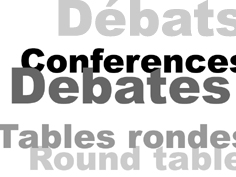
Christian Merlhiot
pointligneplan
0 | 0 | | 0:0 | France | 2007
The last twenty years have witnessed the displacement of a number of artistic borders. The relationships between cinema and video, cinema and photography, and fiction and documentary have not ceased to feed forms and attitudes. Worried about its support, its stakes, and its history, cinema has been one of these critical knots. These questionings are today particularly sensitive to the crossing of plastic arts and cinema by a traversing look of plasticians towards cinema and filmmakers towards contemporary art. It is at this crossing that "pointligneplan" has been finding its stakes, since 1998, by regularly setting up film programmings. Originally organized with the cooperation of the Research Group et cinemagraphic experiments by Christian Merlhiot, and joined by Pascale Cassagnau, Vincent Dieutre, and Érik Bullot in 1999, the programming "pointligneplan" regularly presents, at La fémis or during free hands in festivals and cultural institutions, an ensemble of singular works: filmmakers, artists, and plasticians question and redefine the new distributions of the world and of image.
Since 1988 Christian Merlhiot has produced 19 short and long films, including "Silenzio" in 200. But even if he is a filmmaker, he is also interested in contemporary art, a discipline not quite different from cinema. In 1998 he created "pointligneplan" with the help of the Grec (Groupe de recherches et d?essais cinématographiques), where he was a lecturer, and with the help of François Barat, his general director. A collective born from his desire, and that of other filmmakers, to make their own films and exchange experiences and viewpoints. It is an association created to reunite and distribute works otherwise dispersed in festivals, galleries, and museums, in the same place.
Christian Merlhiot, Daniel LARRIEU
Catalogue : 2014Je reviendrai comme un enfant | Video | hdv | | 1:32 | France, Canada | 2013

Christian Merlhiot
Je reviendrai comme un enfant
Video | hdv | | 1:32 | France, Canada | 2013
Une petite communauté inuit de l?Arctique canadien. Nasri est venu rencontrer les habitants d?Igloolik, descendants d?une société de chasseurs aujourd?hui sédentaire. Dans ce village, il découvre que l?esprit des morts est indissociable du monde des vivants et comprend l?importance des noms hérités des ancêtres et transmis de génération en génération.
CHRISTIAN MERLHIOT est né en 1963 à Niort. Il a suivi des études à l?École nationale des beaux-arts de Bourges de 1981 à 1987. En 1995, il est pensionnaire à la Villa Médicis à Rome où il réalise son premier long-métrage : Les Semeurs de peste, sorti en salle en 2003. Christian Merlhiot a enseigné le cinéma et la vidéo dans plusieurs écoles d?art notamment à Angoulême, Nancy et Bourges. Il est actuellement responsable du Pavillon Neuflize OBC, le laboratoire de création du Palais de Tokyo à Paris. Il est l?un des membres fondateur de pointligneplan. Érik Bullot a consacré à ses films un texte publié dans l?ouvrage collectif pointligneplan aux Éditions Léo Scheer (Fr-2002). Chez le même éditeur, un livre est consacré à l?ensemble de ses films, accompagné d?un texte de Fabien Danesi et d?une édition DVD de 3 courts-métrages (Fr-2003). Son film Silenzio, tourné au Japon en 2004, est sorti en salle en 2006. Il a réalisé avec Matthieu Orléan un Atelier de création raphiophonique pour France Culture qui est ensuite devenu un film : Des Indes à la planète Mars sorti en salle en 2008. Son film intitulé, Le procès d?Oscar Wilde a été distribué au printemps 2010. En 2011, il a séjourné à Kyoto et rapporté de ce séjour au Japon un film intitulé Slow Life. www.minorcinema.com
Catalogue : 2014Ningiuq | Animation | hdv | color | 11:0 | France, Canada | 2014

Christian Merlhiot
Ningiuq
Animation | hdv | color | 11:0 | France, Canada | 2014
In 2009, Rachel Uyarasuk, elder of the Inuit community of Igloolik, evokes the ancestors whose name she received at birth. She explains how this transmission ensured their return among the world of the living.
Catalogue : 2013Slow life | Fiction | hdv | color | 74:0 | France | 2012

Christian Merlhiot
Slow life
Fiction | hdv | color | 74:0 | France | 2012
Kentaro has recently left his hometown. He lives in a village near Kyoto and works in a dyeing workshop. He also does occasional jobs for the villagers and looks after Yukiko, and old mischievious lady who says very little. The more people he meets the more he discovers new modes of living in which time flows differently. He starts to question his future and his role in this new community. On a sunny autumn day, he goes with Yukiko for a excursion to the forest?
Catalogue : 2012Ice dream | Video | hdv | color | 17:27 | France, Greenland | 2011
Christian Merlhiot, Daniel LARRIEU
Ice dream
Video | hdv | color | 17:27 | France, Greenland | 2011
From this desert and mountainous landscapes to the ice sheets diverting near the coast, it seems there is only one step for this man who, from the one to the other, keeps on walking and dancing. Without hastle nor rest, his moving is like a long and continuous event that we would just have to seize, an already ineluctable and invisible transformation.
Catalogue : 2011De la danse / Pièce n°1 | Video | dv | color | 7:0 | France | 2010
Christian Merlhiot
De la danse / Pièce n°1
Video | dv | color | 7:0 | France | 2010
La danse à ses origines s?inspire du mouvement des astres dans le ciel. Immobile au milieu d?un studio de répétition, un danseur lit un extrait du traité écrit par Lucien de Samosate au 1er siècle. Trois opérateurs enregistrent la scène en tournant autour de lui dans un mouvement continu et circulaire.
Christian Merlhiot est né en 1963 à Niort. Il a suivi des études à l?École nationale des beaux-arts de Bourges de 1981 à 1987. Entre 1994 et 1995, il est pensionnaire à la Villa Medicis à Rome pour l?écriture d?un scénario qu?il adapte pendant son séjour et réalise son premier long-métrage : Les Semeurs de peste, sorti en salle en 2003. Christian Merlhiot a enseigné le cinéma et la vidéo dans plusieurs écoles d?art notamment à Angoulême, Nancy et Bourges. Il est actuellement responsable pédagogique au Pavillon, Laboratoire de création du Palais de Tokyo à Paris. Il est fondateur de pointligneplan, un collectif qui situe ses enjeux au croisement des arts plastiques et du cinéma. Érik Bullot a consacré à ses films un texte publié dans l?ouvrage collectif pointligneplan aux Éditions Léo Scheer (Fr-2002). Chez le même éditeur, un livre est consacré à l?ensemble de ses films, accompagné d?un texte de Fabien Danesi et d?une édition dvd de 3 courts-métrages (Fr-2003). Son film Silenzio, tourné au Japon en 2004, est sorti en salle au printemps 2006. Il a réalisé, avec Matthieu Orléan, un Atelier de création raphiophonique pour France Culture diffusé en février 2007. Cette expérience a aussi donné un film : Des Indes à la planète Mars, sélectionné en compétition française au Festival International du Film Documentaire de Marseille 2007 et sorti en salle en avril 2008. Son dernier film, Le procès d?Oscar Wilde, est sorti en salle en avril 2010.
Catalogue : 2011De la danse / Pièce n°3 | Video | dv | color | 13:0 | France | 2010
Christian Merlhiot
De la danse / Pièce n°3
Video | dv | color | 13:0 | France | 2010
Un danseur se remémore les gestes de la chorégraphie créée en 1913 par Nijinsky. Il décrit les mouvements de son corps dans la pièce puis travaille avec un notateur au déchiffrage de la partition chorégraphique. Il déchiffre enfin la dernière scène qu?il décrit en suivant les signes de cette notation.
Catalogue : 2011De la danse / Pièce n°2 | Video | dv | color | 4:0 | France | 2010
Christian Merlhiot
De la danse / Pièce n°2
Video | dv | color | 4:0 | France | 2010
Petit duo en forme de duel sur les glaces de la banquise
Catalogue : 2010Le procès d'Oscar Wilde | Experimental fiction | dv | color | 68:0 | France, Lebanon | 2009

Christian Merlhiot
Le procès d'Oscar Wilde
Experimental fiction | dv | color | 68:0 | France, Lebanon | 2009
Dans le jardin d?une villa face à la Méditerranée, un homme travaille à la traduction arabe du procès d?Oscar Wilde. Sous la lumière d?un soir d?été et tout au long des nuits suivantes, les différents protagonistes du procès se présentent à lui. Il les incarne à tour de rôle et fait revivre les enjeux esthétiques et politiques de ce combat. Cette joute verbale apparaît alors comme la dernière oeuvre - féroce et précieuse - du dandy anglais.
Christian Merlhiot est né en 1963 à Niort. Il a suivi des études à l?École nationale des beauxarts de Bourges de 1981 à 1987. Entre 1994 et 1995, il est pensionnaire à la Villa Medicis à Rome pour l?écriture d?un scénario qu?il adapte pendant son séjour, réalisant son premier longmétrage : Les Semeurs de peste, distribué en salle en 2003. Christian Merlhiot a enseigné le cinéma et la vidéo dans plusieurs écoles d?art notamment à Angoulême, Nancy et Bourges. Il est actuellement responsable pédagogique au Pavillon, Laboratoire de création du Palais de Tokyo à Paris. Il est fondateur de pointligneplan, un collectif qui situe ses enjeux au croisement des arts plastiques et du cinéma. Érik Bullot a consacré à ses films un texte publié dans l?ouvrage collectif pointligneplan aux Éditions Léo Scheer (Fr-2002). Chez le même éditeur, un livre est consacré à l?ensemble de ses films, accompagné d?un texte de Fabien Danesi et d?une édition dvd de 3 courtsmétrages (Fr-2003). Son film Silenzio, tourné au Japon en 2004, est sorti en salle au printemps 2006. Il a réalisé un Atelier de création raphiophonique pour France Culture, diffusé en février 2007. Cette expérience a aussi donné un film : Des Indes à la planète Mars, sélectionné en compétition française au Festival International du Film Documentaire de Marseille 2007 et sorti en salle en avril 2008.
Catalogue : 2009rice bowl hill incident | Fiction | dv | color | 40:0 | France | 2008

Christian Merlhiot
rice bowl hill incident
Fiction | dv | color | 40:0 | France | 2008
This film takes root in an extract from a report issued by the Military Intelligence Service and borrowed from Haruki Murakami?s Kafka on the shore. In this report called Rice Bowl Hill Incident a Japanese school teacher relates an unexplainable and nearly supernatural event that happened to her pupils as they were on a field trip in the mountains. The first sequence of the film shows a natural-setting reconstitution of the event elaborated according to the details given in the report. The second sequence of the film is none but the young woman?s narration of the facts. Filmed indoors, facing the camera, she relates the incident in front of a very unexpected Military Intelligence Service inspector.
Christian Merlhiot is a film maker. He has made ?mischief including fever? (1995), ?Voyage to the country of the vampires? (2001), ?Silenzio? (2005) and ?Indians to planet Mars? (2007). He is founder of a group which has set its stakes on mixing visual arts and cinema. Since 2002, He is responsible for the creative department of pavilion and laboratory of the Palais de Tokyo.
Catalogue : 2007As if?(a Tennis Court) | Animation | dv | color | 7:0 | France | 2006

Christian Merlhiot, Boris VAPNE
As if?(a Tennis Court)
Animation | dv | color | 7:0 | France | 2006
This film is conceived as a "psycho-architectural" experience. A nearly meaningless event - a stray ball ? launches a series of uncontrolled transformations on a tennis court. From this moment on, the surface of the tennis court starts to change shape without the viewer knowing whether he/she is witnessing a mental experience or a true event. The playground gradually becomes anamorphosis to take the form of a module of architecture. This module develops and multiplies to shape a city that keeps expanding and delineates a traffic network. Suddenly the ball's trajectory hits the image and totally absorbs the camera's viewpoint. Like a flow of energy, the image gets caught within the rhythm of an accelerating motion. After a while, the camera slowly begins to drift towards the edge of the space. The viewer can make out the impact left by the ball on the tennis court, and the image slowly scans the whole surface. Was the game really interrupted or is the film but a temporal deflagration occurring inside one of the players' mind?
Christian Merlhiot was born in Niort in 1963. He studied at the National School of Fine Art in Bourges from 1981 to 1987. In 1994 and 1995 he was an artist-in-residence at the Villa Medicis in Rome, where he made his first full-length film, "Les semeurs de peste" (1995). Since then, he has produced several others, including: "Voyage au pays des vampires" (2001), "Chronique des Love-hôtels au Japon" (2002), and "Silenzio" (2005). Christian Merlhiot has taught cinema and video in several art schools, notably at Angoulême, Nancy, and Bourges. He is currently the education director at the Pavillon, Laboratoire de création du Palais de Tokyo in Paris.
Angelica Mesiti
Catalogue : 2023Future Perfect Continuous | Video | hdv | black and white | 8:30 | Australia, France | 2022
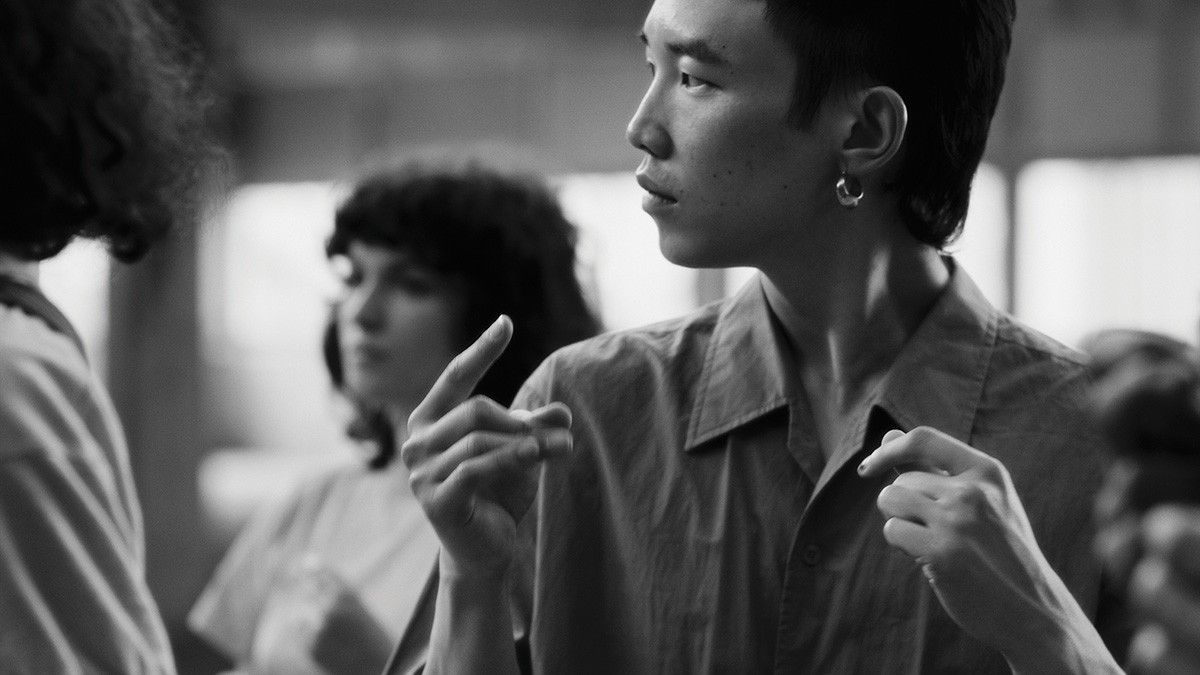
Angelica Mesiti
Future Perfect Continuous
Video | hdv | black and white | 8:30 | Australia, France | 2022
Future Perfect Continuous is an invitation to meditate, to listen closely, and to consider the greater meaning of small gestures. In this work, Angelica Mesiti creates a crease in time and in memory, while offering an anchor to a transcendent idea of community. Future Perfect Continuous is based on a game usually taught to children in a classroom setting as a community building or drama-warm-up exercise. It involves a simple series hands gesture like rubbing, snapping, clapping, slapping that when repeated by the group generate a sound performance that convincingly mimics the sound of a rainstorm. For this video the ‘rain-storm’ activity is performed by a diverse group of young adults in their 20s, at the start of their adult life. 'We can imagine them leaving home and entering society, forming new communities'(1). ‘In my work I often explore the idea of the individual and the collective and how gesture and sound can be used to express a cultural experience or moment. I am interested in how this innocent game of imitating nature could also represent a turbulence that is part of the present. The performers become the weather’(2). 1 Kathleen Ritter 2 Angelica Mesiti
Angelica Mesiti is a multi-disciplinary artist based between Paris & Sydney. Her practice combines performance with video, sound and spatial installation to create immersive environments of absorption and contemplation. Mesiti has long been fascinated by performance: as a mode of storytelling and a means to express social ideas in physical form. In recent years she has been making videos that reveal how culture is manifested through non-linguistic forms of communication, and especially through vocabularies of sound and gesture.There is a focus in her work on the unquantifiable social role played by music — and, by extension, sound in general — in our relationship with the world. Mesiti’s work is regularly shown in museums and biennales internationally. Her work ASSEMBLY was the official Australian presentation at the 58th Venice Biennale (2019).
Catalogue : 2011Rapture (silent anthem) | Art vidéo | | color | 10:10 | Australia | 2009
Angelica Mesiti
Rapture (silent anthem)
Art vidéo | | color | 10:10 | Australia | 2009
Rapture (silent anthem) captures a teenage crowd caught in a slow-motion expression of quasi-religious fervour at a rock concert. Both a celebration of life and a look at the darker aspects of this zeal, the video takes a contemporary look at the human need for transcendence and communal ritual in unlikely places.
Angelica Mesiti was born in Sydney and studied at the College of Fine Arts, University of NSW. She works within the traditions of video, performance and installation and generates material through a range of approaches including staged situations, site specific performative acts, re-enactment and documentation. Her videos operate within a cinematic framework to offer fractured narratives that negotiate between primary experience and historical retelling. She uses performance as a way to embrace the present moment and several of her works focus on the dynamics of group activity as a form of social exchange.
Catalogue : 2009The Line of Lode and Death of Charlie Day | Experimental fiction | | color | 15:45 | Australia | 2008
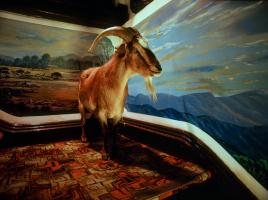
Angelica Mesiti
The Line of Lode and Death of Charlie Day
Experimental fiction | | color | 15:45 | Australia | 2008
"There`s an old man He tells a story In the best way That he knows Of a hill In the desert Where he can No longer go" Set in the Australian outback town of Broken Hill, The Line of Lode and Death of Charlie Day is a story about stories. Reflecting on how different knowledges of one place intersect and overlap, the artist uses video to play with the conventions of cinematic and folkloric storytelling. Three intersecting histories of the region form the backbone of the work: Indigenous understanding of the land, the development of mining in the area including its link to the foundation of Broken Hill, and the story of a local attraction, Mario`s Palace Hotel. These images note how stories are carried by people through generations, and that they are not so much histories set in the past, as an enduring set of relationships between land and people.
Angelica Mesiti 1976, Sydney Australia. Lives and works in Paris and Sydney. Angelica Mesiti is a video, performance and installation artist based in Sydney. Her works often explore the notions of alternative histories sought through layered and less voiced stories embedded within landscapes and urban environments. Her works attempts to discover the unseen possibilities of sites through displaced activities like performance, costume and music. Exhibiting regularly since 2000, Mesiti has had solo and group shows across Australia and overseas including; LOOP Video festival Barcelona 2008, O.K Video Festival (2005), National Gallery of Indonesia, Jakarta, Game On (2006) for the Next Wave festival, Gertrude St Contemporary Art Space Melbourne and the touring show PLAY: Portraiture and Performance in Recent Video Art from Australia and New Zealand, (2006) shown at The Performance Space Sydney, Adam Art Gallery New Zealand and Perth Institute of Contemporary Art. She was a founding member of the Sydney artists run Gallery Imperial Slacks during which time she curated the video publication Serial 7?s. She has been employed by the College of Fine Arts as a casual lecturer in the Time Based Art department since 2001. Since 2000 Mesiti has been a member of the collaborative group The Kingpins, who have exhibited and performed in museums nationally and overseas including the Kunstmuseum Zurich 2008, Musée d?Art Modern Paris 2007, The Palaise de Tokyo and Nuit Blanch-Paris 2006, Liverpool Biennial 2006-UK, Contemporary Art Centre- Vilnius, Lithuania and Zacheta National Gallery of Art- Warsaw 2006, Transmodern Age Festival, Maryland, Baltimore USA 2006, South Korea, 2004 Taipei Biennale,Taipei Fine Arts Museum, Super Delux Tokyo 2004.
Messieurs Delmotte
Catalogue : 2008Head with the cats | Experimental video | dv | color | 1:27 | Belgium | 2006
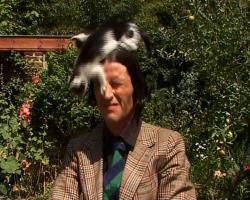
Messieurs Delmotte
Head with the cats
Experimental video | dv | color | 1:27 | Belgium | 2006
The work of Messieurs Delmotte is situated somewhere between reality and imagination, somewhere between genius and dilettantism. Delmotte is distinguished by his dress code and facial appearance. He always presents himself in a two- or three-piece suit. His semi-long hair is another distinctive trait, overabundantly daubed with gel, combed flat against his head and cut straight across at the bottom. The finishing touch, an exceedingly precise stripe down the middle, completes the geometric coiffure. Delmotte puts forth a character who dashingly barrages his audience with gestural discoveries that are as unpredictable as they are absurd. In all this merriment and nonsense lies the existential and poetic revolt of the work. It is always about interfering in a situation, about engaging an hilarious and heroic battle with the trivial object, a character of a given circumstance. In Delmotte`s opinion, society is irrational and possesses insufficient sense of fairness and common sense to dismantle the mechanisms of social conditioning that determine our existence. This explains his escape into the ridiculous, the absurd, the moments of abandoning good taste as an outlet for that which refuses to do battle with society. The physical commitment of his own body as an instrument of unruliness plays a cardinal role.
In the eye of the spectator the work of Messieurs Delmotte (BE 1967, formerly Monsieur Delmotte) often seems bizarre, absurd or trivial, but to Delmotte his surrealist videos and installations of and with trivial actions are an absolute necessity. His shorts, focussing on obsessive behaviour and compulsive initiatives, make out a long series of attempts to pass beyond the limitations of reality, often with a cartoonlike outcome. Delmotte?s work has been shown, among others, at the Museum of Modern Art in Philadelphia, the New York Underground Festival, MUHKA (Antwerp) and Museo Reina Sofía (Madrid). He lives and works in Liège.
Catalogue : 2006Fränz ünd Kofön | Experimental video | dv | color | 12:33 | Belgium | 0
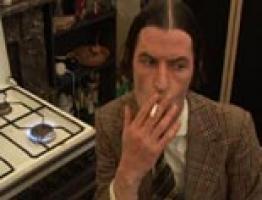
Messieurs Delmotte
Fränz ünd Kofön
Experimental video | dv | color | 12:33 | Belgium | 0
My work is not a performance ? and actually even less of a good idea.? The videos by Messieurs ? or Monsieur- Delmotte spare nothing or no one and they trivialise anything that comes within his reach, including himself. His works are not self-portraits nor transpositions of the author in one or more imaginary characters. Maybe they can only be described as playful abdications of the subject, absurd and almost surreal one-acters. Dangling somewhere between reality and fiction ? or maybe these are even one and the same, exploding in a multitude of disengaged fragments. Delmotte, a self-declared poser, sneers at the institutionalised art world with his mischievous and surprising actions, trivial in content and simple in form. The results are uncomplicated and unvarnished, but also pure and most of all irresistibly charming. Or, as Delmotte puts it himself: "Je le fais, je ne sais pas pourquoi, mais je le fais!
Messieurs Delmotte (°1967) studied at the Liège Saint-Luc institute and he focuses mainly on photography, video and ?performance?. His work fits in with the best Belgian surrealist tradition, somewhere between reality and imagination, between brilliance and dilettantism. In his videos he translates his unbridled boyish pranks, his sneers at the institutionalized art world in one-man actions, as simple as they are absurd, as reflections of the schizophrenic identity of the artist. His video work was presented, among others at the Museum of Modern Art Philadelphia, the New York Underground Festival and the museum for contemporary art MUHKA (Antwerp).
Messieurs Delmotte
Catalogue : 2007Breakdown dream - Melt Umbrella - Extinguishers | Experimental video | dv | color | 7:8 | Belgium | 2006
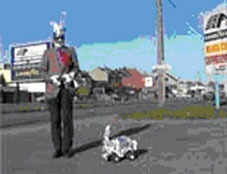
Messieurs Delmotte
Breakdown dream - Melt Umbrella - Extinguishers
Experimental video | dv | color | 7:8 | Belgium | 2006
The work of Messieurs Delmotte is situated somewhere between reality and imagination, somewhere between genius and dilettantism. Delmotte is distinguished by his dress code and facial appearance. He always presents himself in a two- or three-piece suit. His semi-long hair is another distinctive trait, overabundantly daubed with gel, combed flat against his head, and cut straight across at the bottom. The finishing touch, an exceedingly precise stripe down the middle, completes the geometric coiffure. Delmotte puts forth a character who dashingly barrages his audience with gestural discoveries that are as unpredictable as they are absurd. In all this merriment and nonsense lies the existential and poetic revolt of the work. It is always about interfering in a situation, about engaging an hilarious and heroic battle with the trivial object, a character of a given circumstance. In Delmotte's opinion, society is irrational and possesses an insufficient sense of fairness and common sense to dismantle the mechanisms of social conditioning that determine our existence. This explains his escape into the ridiculous, the absurd, and the moments of abandoning good taste as an outlet for that which refuses to do battle with society. The physical commitment of his own body as an instrument of unruliness plays a cardinal role.
Messieurs Delmotte was born in 1967. He studied at the Liège Saint-Luc Institute and he mainly focuses on photography, video, and 'performance'. His work sides with the best Belgian surrealist tradition, somewhere between reality and imagination, between genius and dilettantism. His videos have been shown at such places as the Museum of Modern Art Philadelphia, New York Underground Festival, and MUHKA, Antwerp.
Christopher Messina
Catalogue : 2006Nightlight | Experimental video | dv | color | 9:30 | USA | 2005
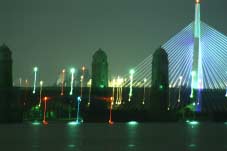
Christopher Messina
Nightlight
Experimental video | dv | color | 9:30 | USA | 2005
An experiment using digital photography, Nightlight is a study of the nights and lights along the Charles River in Boston, Massachusetts. This piece is made up entirely of still photographs, sequenced together to appear in motion. By making subtle adjustments between each photograph taken, the lights of the city seem to come to life.
Born in New York State, Chris is currently living and making films in Boston, Massachusetts.
Mathilde Mestrallet
Catalogue : 2007La règle du jeu | Experimental video | dv | color | 3:50 | France | 2006
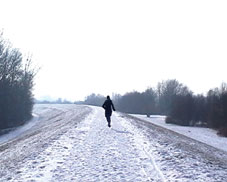
Mathilde Mestrallet
La règle du jeu
Experimental video | dv | color | 3:50 | France | 2006
"La règle du jeu" is part of a series of 8 videos called "Errances". These videos examine the relationship between man and landscape. Each project takes as a starting point a physical displacement, the discovery of a place previously unknown. The artist uses his body as a subject, a silhouette evolving in space, deciding on precise centring, fixed shots, and landscapes to be crossed. We could say that these videos revolve around nothing, a void, and that each video is the result or the narration of the encounter, the experience of these foreign spaces. A young woman is running along some bushes, then hides, as if being pursued. She is attempting to escape, a shot rings out and makes her stop. Playful slaughter, child's game, the camera shoots its victim.
Mathilde Mestrallet, studied Decorative Arts in Strasbourg, France. Her video projects examines man's place in landscape and his relationship to it. She is interested in the different routes that a given site proposes. The videos develop around simple scenarios and productions: a repetition of an action in a place; steps; strolls; and games. The lived experience, the real encounter with the landscape, the relationship to the space as an unknown piece of land, as a foreign place, and territories of possibility are the starting points of each video project. Between 'no man's land' and labyrinthine architecture, the various actors evolve in these oversized spaces.
Barbara Meter
Catalogue : 2009A Touch | Experimental film | 16mm | color | 13:30 | Netherlands | 2008
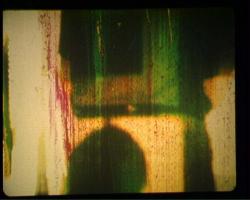
Barbara Meter
A Touch
Experimental film | 16mm | color | 13:30 | Netherlands | 2008
,,,So it all passes, like wind, like shadows and smoke.
Barbara Meter started filmmaking in the late seventies. She has made mainly experimental films but also documentaries and narratives. She has taught film in Groningen, Holland, and at the San Francisco Art Institute. She has curated many screenings of experimental films which were unique for Holland, where she lives and works up till now.
Barbara Meter
Catalogue : 2006Ariadne | Experimental film | 35mm | color | 12:0 | Netherlands | 2004
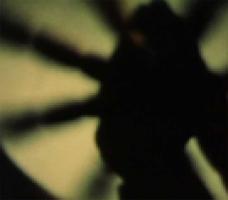
Barbara Meter
Ariadne
Experimental film | 35mm | color | 12:0 | Netherlands | 2004
Constant moving of wheels, threads and sprockets in a homage to the medium of film.
Barbara Meter (1939) attended the Dutch Film Academy in 1963. She makes films since the 70s: documentaries, feature films - mainly experimental. Meter was co-founder of Electric Cinema, in the early 70s a bastion of Dutch experimental cinema; and Stichting Lighthouse in the 80s. At present she also works as a curator of film programs, teacher and free-lance lecturer on film.
Henrike Meyer, Thérèse Nylén
Catalogue : 2009Still Leben | Video installation | | color | 4:56 | Germany | 2008
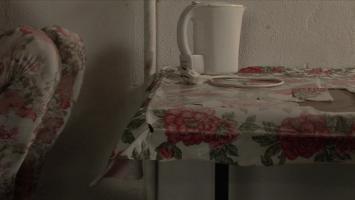
Henrike Meyer, Thérèse Nylén
Still Leben
Video installation | | color | 4:56 | Germany | 2008
?Still Leben? is the fruit of a coproduction between the video artist Henrike Meyer and the choreographer Therese Nylén. The two artists are leaning on the cellar of an asparagus restaurant in Brandenburg. During the three months of the season, the restaurant offers lodging to 150 Polish workmen. The remainder of the year, the 30 rooms remains empty and abandoned. They produce the effect of a time capsule. Plastic flowers in large boxes, scribbled pages from the calendar, graffiti on the wall, cloths on the tables leaving many traces of the passing through of the workmen. Arrangements full of memories. The vision of these arrangements and the dancer is face to face in a 2-Channel-Projection, and are mutually motivated in their movements in a mimetic exchange.
Henrike Meyer was born in 1984 in Hoya in Weser. From 2003 to 2006, he studied theatre, the history of art and literature in Freie University of Berlin, followed on by visual communication at the University of Arts of Berlin up to 2008 and is currently working on experimental creation and media at the same university. He lives and works in Berlin. Therese Nylén was born in 1976 in Malmö, in Sweden. She obtained a degree in modern theatrical dance at the Higher School of Arts of Amsterdam in 2001. In 2005, she was chosen to reside in Scuol, in Switzerland, with the NAIRS Kuturzentrum, and again in 2007, this time with Werkbeitrag Tanz of the canton of Luzerne. From 2001 to 2007, she collaborated in projects with, Martin Butler (Netherlands), Suzanne Marx (Netherlands), Kyle Bukhari (Swiss), and Nina F.Schneider (Swiss) among others. She lives and works in Berlin.
Philippe-alain Michaud
Catalogue : 2007Anthony Mccall | 0 | 0 | | 60:0 | France | 2007
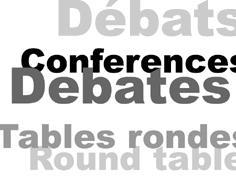
Philippe-alain Michaud
Anthony Mccall
0 | 0 | | 60:0 | France | 2007
Movies are not this projected image that dig fictitious depth into the wall's surface anymore, but truly a constituted surface that blends with the very event of the projection. That is how the beams of light cut out in Anthony McCall's smoke, developing the specifically plastic proprieties of the movie, cross the borders of the history of cinema to join the minimalist propositions of the sculptors of the 70's.
Born in 1961, art historian and critic Philippe-Alain Michaud has been curator and head of the cinema department at the National Museum of Modern Art (MNAM), where he has been supervising the exhibition "Le mouvement des images - Art et Cinéma", since 2003. The exhibition was an original presentation of the permanent exhibition at the MNAM, in which he proposed a rereading of the history of the twentieth century based on the history of cinema. His attention is aimed at the territories situated between plastic arts and the cinema, and he questions himself about the contemporary artistic forms and their history. In 2004 he was the instigator of "Hollywood Déconstruit : remontages, remises en scène, resucées", a cycle that witnesses the manner in which experimental filmmakers and artists have revisited the universe of Hollywood Cinema, at the MNAM cinema. As an author he has written numerous articles and books, including "Le peuple des images", and "Sketches. Histoire de l?art, cinéma". He is a member of the editing board of MNAM's books and is in charge of the "La littérature artistique" collection from Macula editions.